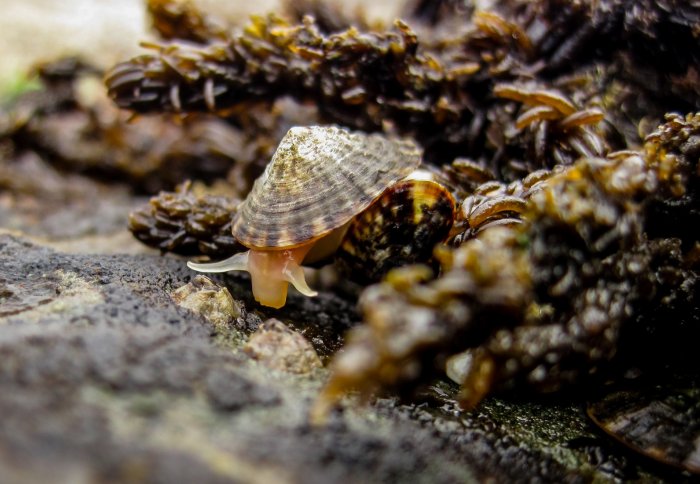Herbivores help protect marine ecosystems from climate change

A limpet on seaweed. Image: Rebecca Kordas
Plant-eating critters are key to helping ecosystems survive global warming, offering some hope for a defence strategy against climate change.
An international research team created miniature marine ecosystems and tested how they fared in warmer conditions. They found that in the hottest conditions, ecosystems that included limpets – voracious snail-like marine herbivores – fared the best.
We want variety because we found it helps protect the ecosystem when you add a stressor like heat.
– Dr Rebecca Kordas
The study, published in Science Advances, monitored mini ecosystems on rocky shores made up of different collections of organisms. The ecosystems were grown on special hard plastic plates that could be individually warmed. This allowed the researchers to test how the different ecosystems responded to temperature rises while in their natural habitat.
Ecosystems are in a delicate balance: removing organisms that do key jobs can cause the whole system to deteriorate. If this ecosystem is then put under stress, it is less able to cope and can collapse.
In these experiments, it was the key job performed by the main herbivore (limpets) that helped the ecosystems stay resilient in the face of warming. Limpets are voracious consumers of algae, and their action prevents algae from building up and using all the available space – a valuable resource on rocky shores.
Variety needed
Lead author of the study Dr Rebecca Kordas, who completed this research for her PhD at the University of British Columbia and is now a research fellow at Imperial College London, said: “The herbivores created space for other plants and animals to move in and we saw much more diversity and variety in these ecosystems.
“We want variety because we found it helps protect the ecosystem when you add a stressor like heat.”

The experimental plates underwater. Image: Rebecca Kordas
The research team studied life in the intertidal zone, the area of the shore between the low tide and high tide, on the coast of British Columbia. This area is home to a community of starfish, anemones, mussels, barnacles and seaweed. As the tide moves in and out, the plants and animals must cope with huge variation in temperature every day, sometimes as much as 20 to 25 degrees Celsius.
Despite dealing daily with these extremes, the ecosystems can be severely damaged by further warming. Dr Kordas said: “When heat waves come through British Columbia and the Pacific Northwest, we see mass mortality of numerous intertidal species.
“These creatures are already living at their physical limits, so a two-degree change – a conservative prediction of the warming expected over the next 80 years or so – can make a big difference.”
Making ecosystems more resilient
The researchers found that in the summer, when temperatures were at their warmest, communities could fare well even if they were heated, but only if limpets were present. Dr Kordas added: “When limpets were part of the community, the effects of warming were less harsh.”

Plates along the shore in Ruckle Park, British Columbia. Image: Rebecca Kordas
Senior study author Professor Christopher Harley from the University of British Columbia says that, in general - consumers like limpets, sea otters or starfish are very important to maintaining biodiversity, especially in aquatic ecosystems. Losing these species can destabilize ecosystems, but protecting them can make ecosystems more resilient.
“We should be thinking of ways to reduce our negative effects on the natural environment and these results show that if we do basic conservation and management, it can make a big difference in terms of how ecosystems will weather climate change,” Professor Harley said.
-
‘Herbivory enables marine communities to resist warming’ by Rebecca L. Kordas, Ian Donohue and Christopher D. G. Harley is published in Science Advances.
Article text (excluding photos or graphics) © Imperial College London.
Photos and graphics subject to third party copyright used with permission or © Imperial College London.
Reporter
Hayley Dunning
Communications Division